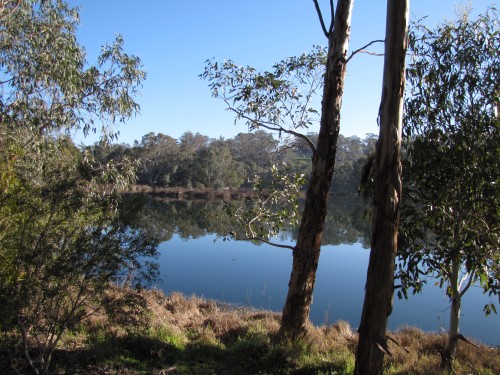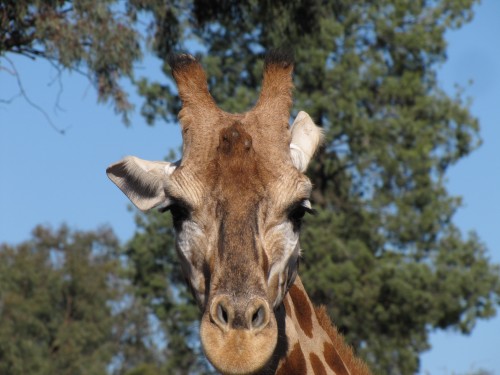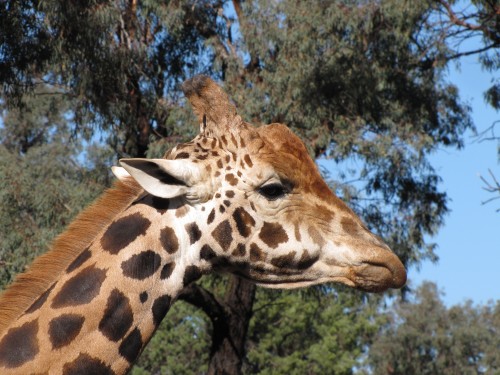Writing prompt: How’s the serenity?
Earlier this week I visited the Laratinga Wetlands on the outskirts of Mt Barker in the Adelaide Hills of South Australia. These wetlands are frequently visited by birders like myself because the ponds often teem with birds. I write about my birding experiences and show photos of Australian birds on my site called Trevor’s Birding.
Many people visit the wetlands every day, including walkers, joggers, runners, cyclists and picnickers.
On this occasion it was early on a frosty morning and the water was still quite smooth. The photo above shows this well. This scene – or another similar which you have experienced – could well be an interesting prompt for your writing.
Here are some writing suggestions:
- Describe the scene in the photo.
- Imagine yourself in the scene shown in the photo. Why are you there?
- Write a short story about a very serene place you have visited.
- Write a poem inspired by the photo.
- Imagine you are a bird – for example, a duck – living in the pond shown in the photo. Describe a day in your life
Good writing.
Trevor
The 2015 Tabor Adelaide Creative Writing Awards
Over the years I have submitted quite a few poems and stories to writing competitions, with a moderate level of success. I should enter far more than I do because I have such a vast number of poems and a few stories that the only problem is actually choosing which pieces go where. I have also been intending sending off far more items to magazines and journals in the hope of being published.
To me there seems little point in all of that writing languishing unread and unloved on my hard-drive. I would encourage my readers to do the same. In the light of that I will include here details of some up and coming competitions and publishing opportunities. Here is the first one:
The 2015 Tabor Adelaide Creative Writing Awards
Submissions for this creative writing competition are now open and will close on March 6th 2015. Only one entry for each category – poetry and short story – is allowed per person. Unlike most competitions, entry for this one is free.
This is the second time this competition has been offered and I intend to submit a poem in the next day or so. I do not have a suitable story on the set theme “Hope against hope” and I am hoping that some inspiration will come my way in the next week or so.
When I was completing my Masters degree at Tabor a few years ago we often talked about the possibility of hosting a writing competition but nothing came of it then. It is therefore great to see it finally get off the ground and last year’s event was a huge success with hundreds of entries from all over Australia.
Link:
- The 2015 Tabor Adelaide Creative Writing Awards – for details, conditions and how to submit an entry.
Good writing.
Writing flash fiction
A few years ago I went through a period of writing dozens of flash fiction pieces, some of them published here on this site. Some of them have also been published in journals, magazines and anthologies. I haven’t written any short fiction in quite some time, something I should correct.
As I see it, writing short fiction, also called flash fiction, is an excellent practice for any writers of general fiction. These short writing activities – from a mere handful of words up to about a limit of 1000 words – are good exercises for developing the various skills for longer fiction, or even for writing interesting non-fiction. At one stage I limited myself to a mere 50 words. That does not give you much room to move; every word must count.
I recently came across a short article about flash fiction here.
You can read flash fiction on the bus, or while you’re travelling between two train stations. You can read it while you’re waiting at the dentist. You can read it in that short time between sex and dozing off. It’s a small involvement for a much larger pay-off.
Good writing.
Further reading:
- Short fiction – links to some of my fiction published on this site
- Short Story Starters – hundreds of ideas for writing short fiction
- Flash Fiction – article on the SA Writers’ Centre site.
Writing prompt: giraffes and other animals
I took the photo above on a recent visit to the Taronga Western Plains Zoo in Dubbo, New South Wales.
The giraffe is looking straight at me as I was taking the photo, prompting me to think that it was wondering what I was doing – or perhaps it is thinking: “Are you looking at me?”
Hardly.
This photo was taken during the time when the general public can get up close and personal with the giraffes. Various species of animals have times set throughout the day when the public can feed and touch the animals. One has to pay for the privilege of interacting with the animals in this way. It also means you get your photo taken up really close as well.
On this occasion there were a few people lined up to feed the giraffes, and many more curious onlookers like ourselves. For the onlookers it also allows some excellent photographic opportunities. This is particularly so with such a large animal as the giraffe.
Writing prompts:
- Write a story or essay explaining what the giraffe is thinking.
- Write a poem about giraffes.
- Write about a close encounter you once had with a wild animal – or one in a zoo or a cage.
- Imagine that humans could ride on the backs of giraffes. Write a story about “The great giraffe race.”
- Imagine being a giraffe for a day. What adventures do you have? Outline the good and bad aspects of being a giraffe.
Good writing.
The benefits of writing short stories
This morning a friend posted on Facebook a quote from another writer, inviting comments in response. The quote went:
Writing 20 short stories of 5,000 words each will teach you more about writing fiction than writing a 100,000 word novel. And they’ll make more money for you too.
The quote is from an article “Writing short stories: 3 tips for creating characters readers love“
I certainly agree with this statement.
Instead of one set of characters and one setting in a novel, you will have multiple settings, you can experiment with different voices and points of view, and include various types of characters in 20 or so stories (unless the stories are in a series written about one character).
Dealing with a diverse range of characters, settings and so on would certainly hone one’s writing skills. For beginner or emerging writers this would be particularly helpful. And to those writers my advice would be “Just write” – anything and everything. The more you practice any skill, the better you should become. Of course, mentoring and getting advice from experienced writers helps too; that’s why I did a Master of Arts (Creative Writing) a few years ago. I would also encourage the devouring of as many books and articles about writing as time allows.
Ray Bradbury (Science fiction writer) once told an aspiring writer to go away and write a million words – then come back and he’d mentor him. Malcolm Gladwell (“Outliers“) says it takes 10,000 hours of practice to develop expertise in any field of endeavour.
I never had much published until I had passed both of those marks. Once a writer has achieved those benchmarks, THEN it is time to tackle that 100,000 word novel – if that is what you want to do. By then you will know how to write, how to develop a character, how to plot and have a fairly good grasp of what it takes to be a writer. As an aside, I spent 35 years in elementary classroom teaching; it was only in the last few years that I caught myself saying that “now I know what this teaching thing is all about.”
By the way – later this year I should pass the 3 million word mark and next year the 20,000 hour mark. Despite this I have so much more yet to write about, and the more I write, the more I discover and imagine to write about.
I’ve only covered on small quote from the article my friend found. It has far more to say, especially about turning those short stories into e-books to make more money than a novel might ever produce.
Thanks to Jade for the inspiration to write this post.
Good writing.


